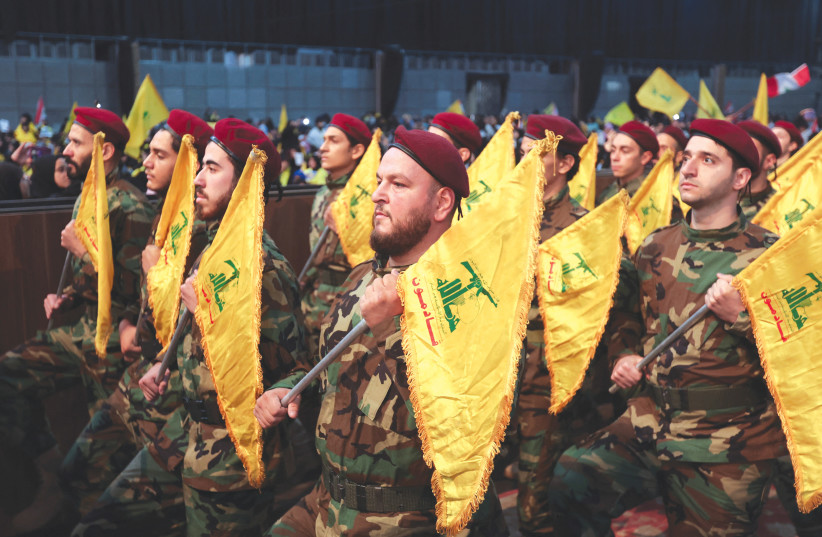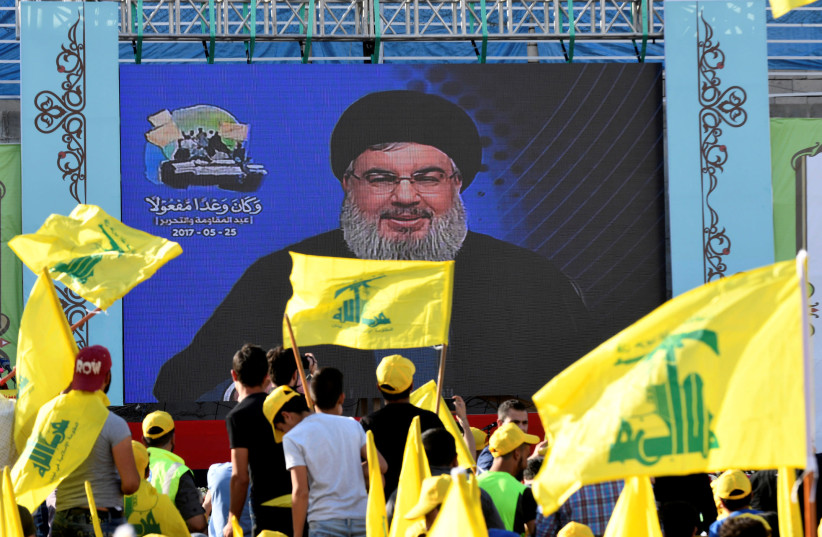Iranian news says a Hezbollah official sanctioned by the US has given an exclusive interview that may shed light on the 2006 war, Syrian operations, and how Hezbollah controls Lebanon.
SETH J. FRANTZMANSEPTEMBER 25, 2023 20:45

Iran’s pro-regime Tasnim News says it conducted an interview with Wafiq Safa, a sanctioned Hezbollah terrorist. The Hezbollah member is frequently described as a senior Hezbollah official. He is accused of being in charge of Hizballah’s Liaison and Coordination Unit and is “responsible for Hizballah’s coordination with the international community and with Lebanese security agencies,” the US Department of the Treasury said in 2019.
In 2022, after Hezbollah murdered an Irish UN officer, he was the Hezbollah official who apologized. He claimed that it was an “unintentional incident.” At the time Reuters said that “Wafiq Safa told Reuters his party offered its condolences ‘after the unintentional incident that took place between the residents of al-Aqbieh and individuals from the Irish unit,’ and urged the party not be ‘inserted’ into the incident.” In fact, Hezbollah was linked to the killing.
Now Safa has held an interview with Iran’s Tasnim News. This has the potential to provide insight into Hezbollah operations going back decades. This includes insights into the 2006 war with Israel and also Hezbollah’s role in Lebanon and Syria. Hezbollah has succeeded in playing a key role in Lebanese politics and often increases tensions with Israel. In the past year, Hezbollah has seized the opportunity in the wake of a maritime deal between Israel and Lebanon, to pressure Israel.
The US Treasury Department said back in 2019 that “Wafiq Safa, serves as a Hizballah interlocutor to the Lebanese security forces. As the head of Hizballah’s security apparatus, which is directly linked to Secretary General Hassan Nasrallah, Safa has exploited Lebanon’s ports and border crossings to smuggle contraband and facilitate travel on behalf of Hizballah, undermining the security and safety of the Lebanese people, while also draining valuable import duties and revenue away from the Lebanese government.”
The report said at the time that “Safa was appointed by Hizballah Secretary General Nasrallah in 1987 as the head of the Security Committee, which was later renamed the Liaison and Coordination Unit. As one of Hizballah’s prominent leaders, Safa is a part of Hizballah Secretary General Nasrallah’s inner circle.”

The US said that he was linked to Hezbollah financers. “ In 2010, there were internal Hizballah accusations of corruption involving Safa; however, Hizballah has since continued to allow him to maintain a prominent role in the organization. Safa was accused of smuggling, other crimes, and immoral behavior,” the US said. A report at Al-Ain media in the Gulf noted also that in “2018, Safa facilitated the entry of suspicious shipments, in addition to facilitating services at Beirut Airport for the travel of Hezbollah parties.”
Tasnim says its interview with Safa is exclusive and unique. This is the first time that Hizballah’s [secretive official] is interviewed by an Iranian media.” The interview will be published in multiple languages Tasnim says. According to the report, the Hezbollah official will tell “untold stories” from the 2006 war and the “reason for the capture of two soldiers of the Zionist army.” The report by Tasnim claims Safa was linked to negotiations about the return of the bodies of IDF soldiers Ehud Goldwasser and Eldad Regev in 2008. The interview will also look at the maritime deal between Israel and Lebanon. “The narrative of the senior Hezbollah security official will also include details about his meeting with Joseph Aoun, the commander-in-chief of the Lebanese army.”
Safa’s long history in Hezbollah
Safa was born in 1960, Tasnim News says. He was born in Natabieh, a town in the hills northeast of Tyre. It is also situated northwest of Metulla. He joined Hezbollah in 1984, soon after it was established. “His talent and skills in security affairs on the one hand and solving family disputes in the Shiite areas under the influence of Hezbollah on the other hand made him become the head of Hezbollah’s ‘Security Committee’ in 1987.”
Two years later he was promoted in the wake of the Saudi-backed Taif agreement which ended the Lebanese civil war. The Taif Accords, Tasnim notes, recognized that Hezbollah could keep its arsenal of weapons as “weapons of the national (Islamic) resistance of Lebanon.” This let Hezbollah become a state within a state and stockpile a massive arsenal to fight Israel. Since then Hezbollah has basically taken over much of Lebanon and conducted its foreign and military policy.
Safa was the key official speaking with the Lebanese military and security officials and institutions. “In 1996, when Hezbollah first negotiated with the Zionist occupiers through German mediators for the exchange of prisoners and bodies, a committee in Hezbollah took responsibility for these negotiations, the main parties of which were Wafiq Safa, Hezbollah commander Mustafa Badreddine, and Imad Mughniyeh. Mughniyeh was killed in 2008, and Badreddine in 2016, meaning Safa is the last member of the triumvirate.
He is credited by Hezbollah with a further role after Israel left Lebanon in 2000. He also conducted other activities in 2004 and the Tasnim report says “this situation was repeated after the 33-day war [2006 war] until in 2008, a person like ‘Samir Kantar’ was released from the Zionist prisons.” Kuntar was killed in 2015 after being released.
Safa is considered one of Hezbollah’s most skilled officials, the report says. He plays a key role in Lebanon as a negotiator and also works the local political scene. After the Syrian civil war began in 2011 he was sent to Syria to coordinate during the Hezbollah operations around Qusayr. He was present there in 2013. Clearly, he has gone from strength to strength in the wake of the success in Syria. Sanctioned in 2019, he has now apparently opened up a bit about the ”box of secrets” he carries.
Content retrieved from: https://www.jpost.com/middle-east/article-760418.